| Reviews & Columns |
|
Reviews DVD TV on DVD Blu-ray 4K UHD International DVDs In Theaters Reviews by Studio Video Games Features Collector Series DVDs Easter Egg Database Interviews DVD Talk Radio Feature Articles Columns Anime Talk DVD Savant Horror DVDs The M.O.D. Squad Art House HD Talk Silent DVD
|
DVD Talk Forum |
|
|
| Resources |
|
DVD Price Search Customer Service #'s RCE Info Links |
|
Columns
|
|
|
Sopranos - The Complete Series, The
HBO // Unrated // November 11, 2008
List Price: $399.98 [Buy now and save at Amazon]
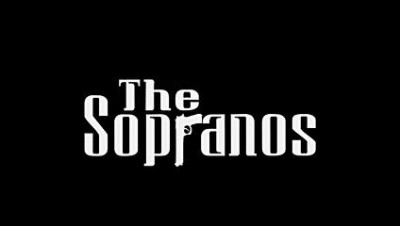
Sifting through all the crap on television can get tiresome in a hurry. Every channel offers different renditions of similar ideas that have been done to death. Certain parts of the year, it's all about reality shows. Other parts of the year, you could be struggling with a bombardment of cheesy sitcoms that never seem to leave you satisfied. Once in a while however, once in a great while, a series comes along that carries its own unique voice, one that you know will never be replicated. HBO gave the world such a show back in the beginning of 1999, The Sopranos.
Although the mafia had already been exploited by Hollywood, there wasn't anything that was out there keeping tabs on 'family' life in current times. Sure, films like Goodfellas and Casino were more modernized than The Godfather, but they didn't reflect the world that you and I live in every day. Series creator, David Chase, wanted to share with us the everyday life of a mob boss, not just the whacking or violence. Sure, we've seen it done in the movies I've already mentioned, but a movie only has two or three hours to provide us with the entire picture. A television series however, can take its time and truly make the audience feel like they're watching and growing with the characters they follow year after year.
That's where Tony Soprano comes in. He's a successful man that really shouldn't be able to complain about what he's got going for himself. He has a lot of 'income', a beautiful wife, a picture perfect pair of children, a healthy appetite, and even a swimming pool in the back yard. Despite the happy picture that's painted purely on the merit of his family and success, Tony has a lot of emotional baggage. After passing out from a panic attack in his back yard, his doctor recommended he should see a therapist to get some of his issues sorted out. Skeptical, Tony goes along with the idea, and heads to his first appointment with Dr. Melfi.
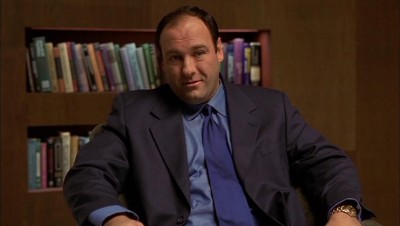
Therapy might be normal for a lot of people, but it doesn't gel well with Tony. Everything about it is wrong, his lifestyle doesn't permit it. You see, despite telling people that he works as a waste management consultant, his 'job' is really being the boss of New Jersey. He's a successful man, but he has a lot of demons in the closet from growing up around the trade, and nothing comes easy when you're trying to balance your family life along with the family, especially when you have to resort to talking to a therapist. Such an act would be considered an act of weakness to all of his associates, a sign that he might be willing to give up valuable information under the right circumstances.
This is a major concern, but it's only the tip of the iceberg, as it's only the beginning of a chapter in Tony Soprano's life we would follow over the course of six seasons (eighty six episodes), of which the final was split into two parts.
In its first season, The Sopranos seemed like a simple idea on paper, showing us how a man today would have great difficulties balancing 'work' with his nuclear family. His Uncle Junior had been waiting for the reigns as acting boss, and he resents his nephew for wanting to pull the rug out from under him, and he'll stop at nothing to get what he wants. He even enlists Tony's mother, Livia, as sort of a behind the scenes consigliore to mastermind something devious. Tony's wife, Carmella, is more than aware of Tony's 'business' and extra-curricular activities, even those that involve him sleeping around with a Russian whore. His daughter is dabbling in drugs and heading off to college, and his only son is turning out to be a lazy trouble maker. His nephew, Christopher, is an up and comer, and can't stop stepping on peoples toes while trying to earn entry to the family business.
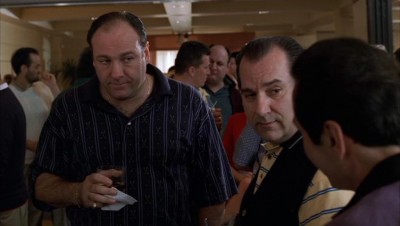
As the series progresses past the second season however, it becomes very clear that The Sopranos isn't really so much about its advertised 'family vs family' concept. Although it does a great job at balancing out the lives and arcs for practically every member of the cast, The Sopranos reveals itself throughout the rest of its run as an incredibly deep character study above all else.
Tony is much more than just a mob boss and family man. When you take a look at everything you learn from watching the series in its entirety, you can almost come to the conclusion that the mafia aspect of the story is nothing more than a stage. The 'crime family' aspect acting as the stage is perfectly suited for the type of man Chase wanted to portray. Yes, Chase was inspired to make The Sopranos based on flicks like Goodfellas, but the character we follow as opposed to the stage the character is placed, is much bigger than anything else in the series.
Despite the fact Tony has a small army of mobsters at his disposal, and a ton of money that could buy him almost anything he would ever need, the intrigue that glues us to Tony, as well as the show, is based on an underlying trait he has to self destruct. The outer layer of the character we see is normal enough. We see Tony deal day in and day out with business problems that constantly make him enemies, puts his life in danger, and leaves those he loves in the crossfire at all times. However, the layer that's seemingly hidden in shadow reveals itself when we see how Tony reacts to his problems.
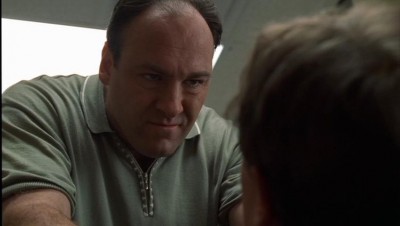
Tony knows very well how to get people to do what he wants, he wouldn't have been able to be a mob boss if he didn't. The method that's always kept everyone around him on their toes is the fact that any little thing could make Tony erupt into a rampage without notice. The longer we get to know him, the longer we see him in therapy, the better Tony gets at using people, abusing people, and in the end, rationalizing it all within himself to the point where he almost thinks he's a noble hero.
He contradicts himself constantly, complaining about the morality of others, and why he does what he does in order to straighten them out. Yet ironically, Tony is always looking inward, trying to figure out what moral stand he needs to take in order to make a situation work in his favor. Instead of his decisions dissolving situations, he usually takes cues from his discussions in therapy and applies them to make the wrong choice, while making himself believe that what he's done is somehow righteous. He's such a strong, respected, and feared man... yet he needs to feel that kind of validation.
At first, his rationalizations seem to be well within the realm of normalcy. To us, we'd say he was making little white lies, or just rationalizing to make himself feel better from time to time. That's fine, but it develops into something that's much bigger than that. It's quite clear that Tony, although he cares on some level for his family and 'friends', really never puts anybody first over himself.
He's a guy that's funny, cool, strong, just probably someone you'd love to sit down and have a beer with. Despite the fact that you can often view him as a really low life piece of crap, almost inhuman at times due to his cold and heartless nature, there are times you just can't help but love and root for him.
This understanding of the main character brings out my favorite aspect of The Sopranos in its entirety, and that's the fact that it's a controversial show. I don't mean controversial in a 'grabbing headlines due to excessive language or violence' sort of way, which it does have plenty of, but more of a 'fan base has been split down the middle' sort of way. You can talk to a random handful of fans, and I guarantee you're going to hear very mixed opinions about the main character. You'll hear some people say they absolutely love the guy, others will probably say they're torn, and there will inevitably be those that say they can't stand him. To say the mixed set of opinions about the main character of the show is intriguing, would be an understatement.
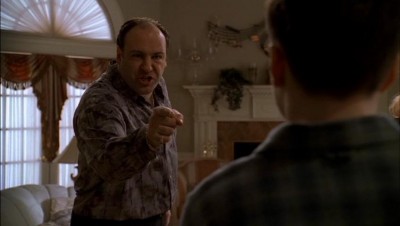
Why would David Chase create a character that wasn't intentionally supposed to be seen in a particular way? It's because The Sopranos couldn't have worked as well as it did, if we didn't believe the dramatic universe on the screen was our own. Even though most of us aren't as self centered as Tony, his constant struggle of questioning his own actions reminds us of the darker side that's within each and every one of us... it's just a matter of degree.
Unfortunately, Tony uses his therapy as a crutch to make believe everything he does is OK, and that anything bad is always someone else's fault. Despite some of the complaints from fans that Tony may very well seem to be inhuman, he's in fact, very human, and it's a terrifying thing to realize, especially when some of the decisions he makes can cost others their lives. Not only does it cost them their lives, but there's a sense of terror in facing the humanity in Tony as he rationalizes such a thing. That's right, I said humanity, because in the end, the big difference between Tony and the audience, is that he's willing to say and do what everyone else is thinking.
Not only does David Chase understand how important it is to have a character that can't be labeled, because that ultimately makes them almost as real as you or I, but he also understands how real events in everyday life works, and he utilizes that realization in the show as well.
Undeniably, another part of the show that seemed to split fans down the middle was the fact that not every situation in the show was resolved. Sometimes an event would happen, and where a typical show would tie up the so called 'loose end', The Sopranos would just leave it hanging out in the wind... intentionally. This made the universe around Tony seem just as real as the man himself. Life doesn't always bring everything to some form of closure, and neither does the show.
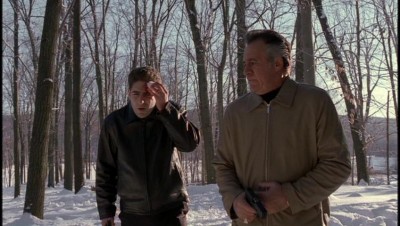
There's not much that's linear about the show in the traditional sense. I don't mean the story is all discombobulated like a Quentin Tarantino film or anything, it's just that it's a multi-layered experience that doesn't play by the same rules that any other show does. Opinions are going to vary depending on the person you're talking with about the show, because nothing is ever spelled out for the audience. There's a lot that happens on screen that tells a good enough story, but with multiple viewings, you're going to find yourself thinking about what you saw after every episode. You may not always like how you feel at the end of a particular episode, and you may not even like how the series itself ends, but it's the journey that makes this show so very compelling, and more dramatic and relevant than anything you've ever seen before.
If you've never seen The Sopranos before, you're literally missing out on one of the greatest milestones in televised history, period. The acting from all the players is phenomenal. The series features numerous guest stars, as well as guest directors. Steve Buscemi happened to occupy both roles for the show during its run, for example. Things happen in an earlier season that may not come to fruition for two or three seasons. Sometimes things just happen, and that's the way it goes, no closure, no resolution. The writing is sharp, and everything that's put on screen seems like it was thought out with surgical precision. Some people fell off The Sopranos wagon over time, but for the wrong reasons. Certain members of the audience wanted the show to be all about 'whacking' and fatal beatings. Although that's part of the situation we observe, and some conflicts are ultimately resolved through such methods, that's not what the show is about at all. It's bigger and smarter than that. This is a show that never insults your intelligence, and always leaves it up to you to come up with your own minor variations of why things happened the way they did. You owe it to yourself to watch this show, like, right now.
The Sopranos always had the best transfers that were available at the time of their release. The later seasons were close to perfect, only showing some very minor macroblocking due to the dark tone the show tried to provide, which utilized a lot of dark shadow lighting methods.
However, the earlier seasons had an unnatural sharpness to them, as well as some nasty edge enhancement to boot. This complete collection features remasters for all 86 episodes, and I understand this alone may be one of the reasons you're thinking about picking this boxed set up if you already own the rest of the series. I've taken some screenshots, although due to the size that's allowed from the review, I can't show you full screen grabs. You may find that the frames I have grabbed may not be the exact same frame, but they're pretty darn close, and does provide an accurate representation of what you can expect. Each series of comparison shots will first display the original DVD transfer, and then the new image that can be found on this new set. After the smaller full screen captures I have taken I will show some up close examples of the full size shots I had taken, so you can see some of the difference in quality better.
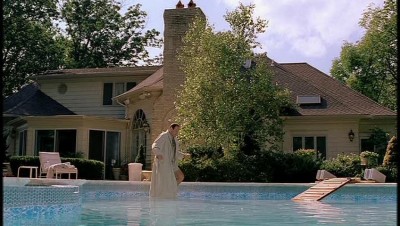
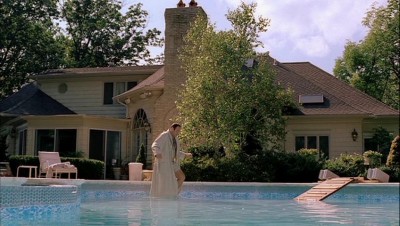
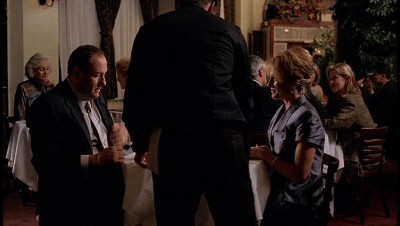
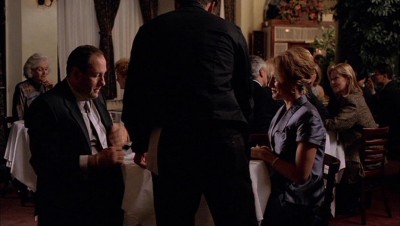
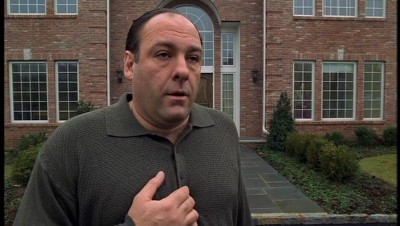
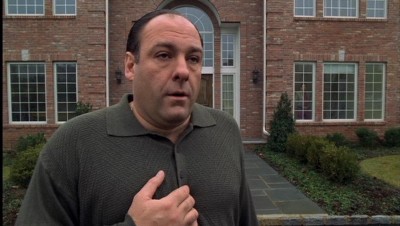

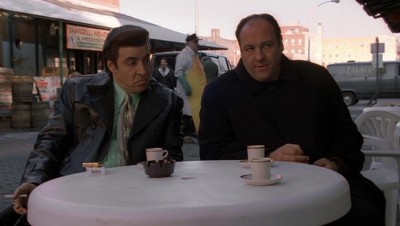
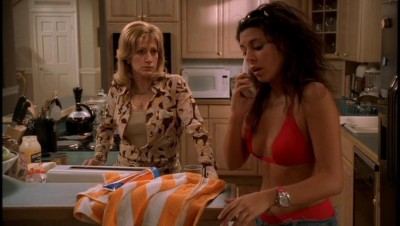
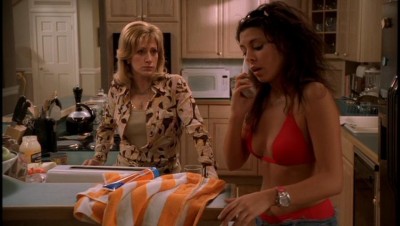
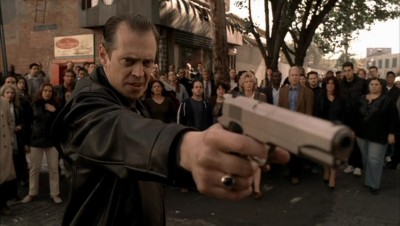
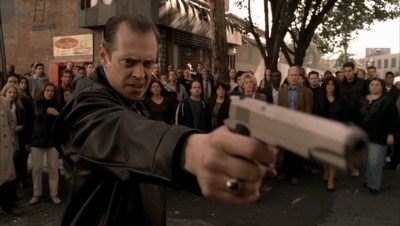
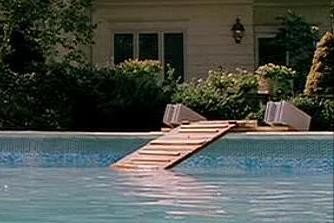
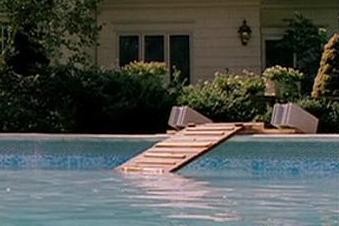
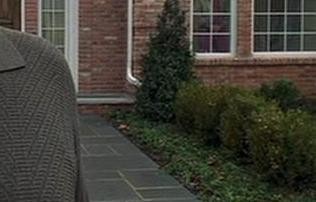
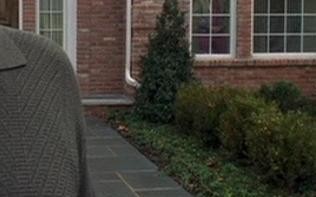
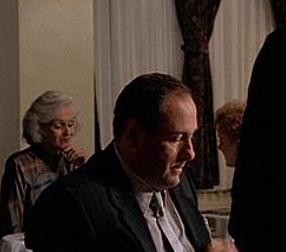
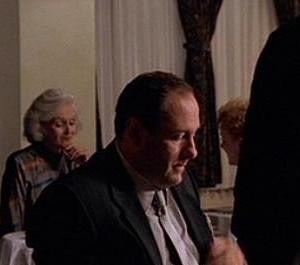
Obviously, you need an HDTV to see the true difference between transfers for any product, so take the images above with a grain of salt. However, even from the screenshots I've provided, you can see that the unnatural sharpness that was on the first season set has been altered for the new release. What you'll also notice however, is that the clean-up process also seems to have traded in unnatural sharpness, for a bit of softness. Unfortunately, the comparisons above seem to prove the new remasters, although cleaner, are missing some detail.
There was a bit of excessive grain that was apparent on the first season set, and although it's still there, it's not as rampant as it used to be. I'm not sure if they applied DNR or not, but whatever filtering method they used, it appears to have created a softer image than what should have been, and it does seem to provide the same kind of effect DNR would produce. So I guess if it walks like a cat and it meows like a cat....
On the bright side, as I said, excessive noise created from the prior season one release is now down to a much more natural level, and macroblocking is to the minimum that the later individual season releases were able to produce. Edge enhancement is a huge, huge, huge improvement over the prior release.
The second season didn't have a boat load of excessive noise caused by the grain on film, and the edge enhancement wasn't blown way out of proportion like the first season. However, it seems the same filtering method has been applied to the second season as well. The third and fourth seasons have changes that are so minor in picture quality, they're negligible. If you do a screenshot comparison back and forth between the two releases, you'll notice a very slight loss of detail in the new boxed set, but again, this is a negligible amount for these seasons. Minor macroblocking has been cleaned up for these seasons however. Seasons 5 and up show an even more negligible difference in picture quality, if not being completely untouched since they were already looking pretty good.
I'm torn on the 'upgrade' that has been provided to us. On one hand, we have a picture in the earlier seasons that isn't littered with digital noise and edge enhancement, and isn't overly sharp. On the other hand, the clean-up process, although removing such obnoxious encoding issues including macroblocking, has left us with a picture that's missing detail from the prior releases. In the end, it depends on what's important to you. Do you continue to watch with edge enhancement and compression artifacts, or do you take a slight hit in detail and watch the cleaner version overall?
The audio is presented in Dolby Digital 5.1, as it has always been. Don't expect anything different than what you already have on DVD, which isn't a bad thing. The show is mostly front heavy, as the show is almost entirely driven by dialogue. There are moments in clubs or when a song is blasting over the soundtrack that really utilizes the surround effectively, but other than that, this show was never overwhelming in its directionality. The later seasons do a better job at providing an engulfing experience with light sound effects from the surrounding environment, but even then, there wasn't too much surround action. This is how the show was presented on HBO though, so it's not the fault of the transfer. The dialogue itself is crisp and clear, and there's a really nice dynamic range that accurately represents everything from quiet whispers, to Tony's shouting.
Audio is also available in French and Spanish 2.0, and subtitles are present in English, French, and Spanish.
Let's talk about the packaging first, since everyone is surely concerned over how well the set has been packaged, if any of the 33 discs provided will be loose, or how the condition of the discs are going to be.
The outer shell of the entire package has a very simplistic design. It's a box that's covered in a black cloth, and in a shinier black on the front of the box, is where The Sopranos logo resides. Lay the box on its back, and you'll be able to remove the top half (or front side when standing up) of the box, revealing a red cloth interior. Inside the red interior is a soft, cloth sack, and inside that sack is the big book that contains all 33 discs, as well as an episode listing for each page of discs, and even a brief description of each episode in the series near the end of the book.
The book-in-sack isn't going anywhere, as there are strips of foam holding it firmly in place. Being packed so tightly would normally prove to be a challenge, but reminiscent of the original season sets, a black strip of fabric is folded over the contents inside the box for ease of use when talking them out.
Once you take the book out of the sack, you'll notice the outside is made of the same cloth material the outer shell was, but this time The Sopranos logo is in red, as was customary at the beginning of each episode.
Since the entire set is packaged to be like a big fat collector's book, the discs themselves are housed within the cardboard pages. That's right, the discs are not sitting on plastic hubs, they sit inside cardboard sleeves instead. It's not quite as bad as you would think. Don't think of the awful sleeves inside the Futurama features on DVD, or even the latest season of The Simpsons. Half of a disc will sit behind the cardboard page, and the top half of the disc (label side) is exposed. However, the cardboard housings for each disc are sunken into the page, so they don't have the opportunity to slide out during shipping.
The set I received had five discs that were scuffed with a series of minor abrasions. Two of the discs had a small, but nasty scratch on them. A friend of mine purchased the set, and found probably a good eighty percent of the discs to have scuffs and minor abrasions on them, but no scratches that would cause any of the discs to be unplayable. Keep this in mind, because your mileage may vary.
For those of you who were fairly lucky with a set of nearly clean discs such as I was, you'll only have to worry about getting scuffs on the discs if you're careless with them. Enough of the hole at the center of each disc is exposed enough for you to grab with your thumb, and there's a spot within the cardboard sleeves for you to be able to grab the outer edge of the DVD with a finger. If you gently lift and slide your disc out, you'll avoid contact with the cardboard.
The first thing you'll notice when you pop in the first disc of the entire series, is that the menu system has been revamped to be a closer match to the menu's that were provided on the old releases of seasons 4-6. The menu system is unchanged for the later seasons however, so don't be alarmed or think you have the wrong discs when you feel like you've seen those particular menus before. I guess you can sort of say they 'George Lucas-ed' the menus for the first few seasons.

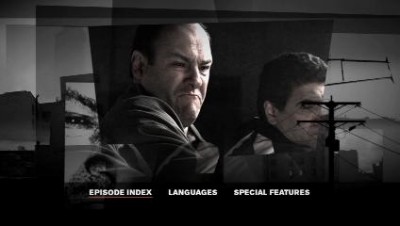
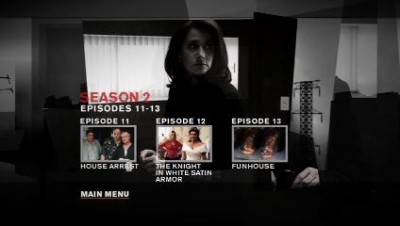
Everything on the actual season discs themselves are pretty much identical in content to the original releases. The commentaries are exactly the same, and there's no additional content to look for. All of the new bonus material is included on two discs that are exclusive to this set.
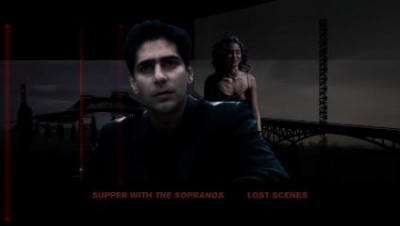
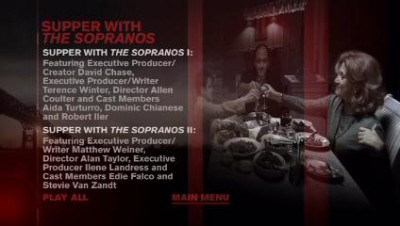
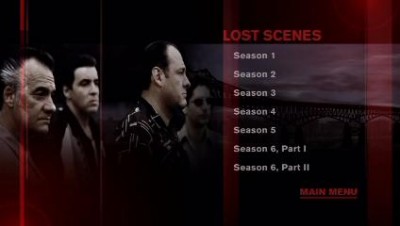
Supper with the Sopranos 1: Featuring Executive Producer/Creator David Chase, Executive Producer/Writer Terence Winter, Director Allen Coulter and Cast Members Aida Turturro, Dominic Chianese, and Robert Iler - Instead of rehashing episode after episode with commentaries galore, the above mentioned sit down to an Italian style dinner to discuss numerous aspects about the show.
It's a very interesting listen, because all the fat is gone from the discussion. The most surprising aspects of the series in its entirety is discussed here, and yes, even the controversial finale. In fact, they start off talking about how they ended the show, how the public reacted, and what their reactions were based on that. You don't get a definitive answer as to what happened, but David Chase does express that he was disappointed in how many people wanted to see something bad happen to Tony, and we're told that the ending was befitting of the series because it was unpredictable. This first feature runs at about 35 minutes in length.
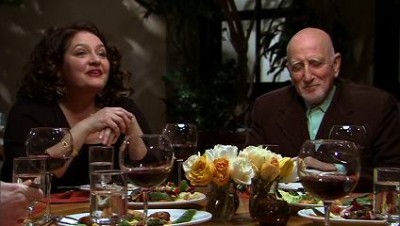
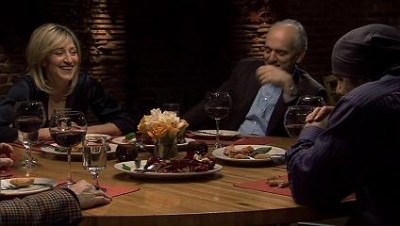
Supper with the Sopranos 2: Featuring Executive Producer/Writer Matthew Weiner, Director Alan Taylor, Executive Producer Ilene Landress and Cast Members Edie Falco and Stevie Van Zandt - Although it's not mentioned on the feature listing, David Chase takes part in this discussion as well. Things kick off with Chase shining a light on how people felt about how the Soprano kids ultimately ended up. He says the most interesting thing, is that nobody really liked how they ended up, but they did end up in a better place than where they started. Did the arc for those characters end up being as significant as they would have been on a typical television show? No, but the closure we have on their lives (if you can call it that) makes sense, and only further adds to the sense of reality that Chase was trying to convey in the show. The conversation moves on to discuss the character of Carmella, and the choices she made throughout the course of the show, and eventually they come back around to talking about how the finale ended once again. This runs a little over 35 minutes as well.
These features are much better than the awful commentaries that are provided for the series, but there's a pretty big elephant in the room, isn't there? Where's James Gandolfini?
Lost Scenes - There are deleted scenes provided for every single season of the show, and I found myself pleasantly surprised with what I saw. Usually deleted scenes are fairly worthless on any given set, but the scenes provided here actually add a little more depth to the characters, as well as certain moments throughout the series. Don't expect an extended ending to the finale though, you sneaky bastages!

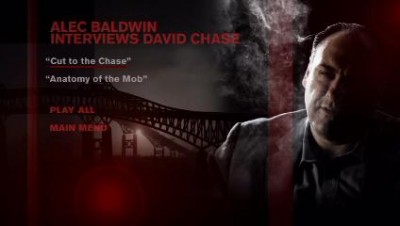
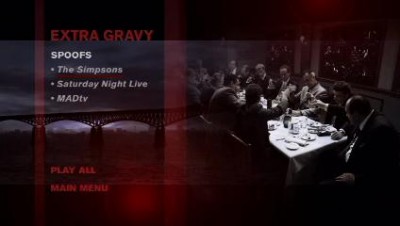
Alec Baldwin Interviews David Chase - This is split up into two different features. The first, Cut to the Chase, has Alec asking David about his dreams and aspirations earlier in life, what his influences were, and what ultimately got him to do The Sopranos. Alec gets David to talk a bit about the advantages to doing a mob story through a television series, where he got his real life references from for the show, the nerves behind competing alongside Analyze This, and even a little bit of an argument that was stirred up amongst staff while writing the College episode in the first season.

The second part of the interview, Anatomy of the Mob, continues with the rest of the 45 minute interview between Alec and David. This focuses more on talking about casting decisions, the continuing development of the characters throughout the series, why certain ends were met for certain characters and how it affected the people behind the scenes, the stigma of using so many people from famous mob films, and more.
I'm not really a huge Alec Baldwin fan, but he did a great job conducting this interview. All 45 minutes were a fantastic watch, and it shouldn't be missed. I wouldn't recommend watching this unless you've seen the entire series however, as they do get into specifics about certain events throughout the course of the show.
"Whacked Sopranos" - Featuring Executive Producer/Creator David Chase, Director Terence Winter and Cast Members .... - I intentionally left the names of the actors off of the description tag, because I don't want to sit here and tell you all about which characters die throughout the series. This featurette is all about the above mentioned, as well as the unmentioned cast, sitting down with Bryant Gumble for a feature hosted by The Museum of Television and Radio, and being asked about what it was like to be a part of the show. They dish about prepping mentally for a shoot, all the different aspects of what it was like to be 'whacked' on the show and never be a part of the cast again, and more. A very interesting watch, and this feature is almost an hour and ten minutes in length.
Also included on this disc, is a collection of three Spoofs from The Simpsons, MadTV, and SNL. The Simpsons clip is only about a minute, and it's a spoof of the intro to the show. MadTV and SNL were fashioned to be quick skits (duh), but the only spoof that seemed to make me laugh at all was the MadTV one. They basically go through an entire episode of The Sopranos, but cut out all the bad language, violence, and sex... which leaves us with a show that's only a few minutes long.
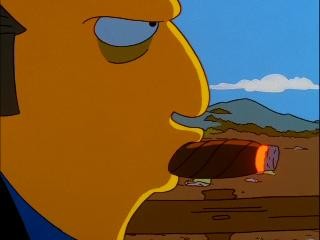
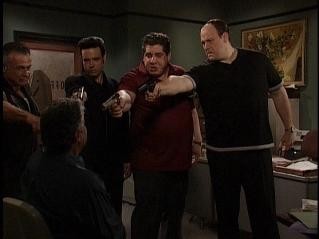
There are three audio discs included in this set as well. The first disc, The Sopranos: Music from the HBO Original Series, as well as the two disc Peppers & Eggs compilation, have already been released on CD. There are no additional CD's that are exclusive to this set, and the music that's provided is only from the first few seasons. It would have been nice if there was a better compilation for this set that encompassed the entire soundtrack to the show, but I guess it's nice they included these audio CD's when they really didn't have to.
Although the commentaries are all the same, and two discs of bonus features in a 33 disc set may seem a little underwhelming, but there's actually a pretty decent set of extras here. They're not filler material (minus the Spoofs), and they're all fairly lengthy and informative. The real disappointment is not seeing James Gandolfini making an appearance on any of the features, but with how secretive the show always tried to be with its audience, I guess a lot of people are going to be pretty happy with what's available in this set.
The Sopranos is television at its best. There's so much attention to detail in both script and production quality, that the intense mob drama practically earns the right to be considered a part of cinema, not just television. I've spent quite a bit of time discussing the merits of the quality of the show with you though, so let's cut to the chase. Is this a must own for everyone? As much as I would love to say, "OHMYGAWRSH YES", the truth is that it really depends on you.
If you're a videophile, you have to ask yourself what's more important about the quality of a picture. Do you take a picture that sacrifices a little detail to watch the show without any digital compression defects, or do you take the older sets, compression defects and all, for the sake of seeing every bit of detail?
If you're willing to buy anything you already own just for some additional extras, are the extras provided on these two bonus discs compelling enough to make you fork over $250+? Are you someone that hates scuffed discs in a cardboard page with sleeves built in?
These are the questions you really need to be asking yourself. Instead of telling you what you should do, I'm just going to leave it be. You have the evidence, and I've done my best to show you. However, if you don't own a majority of the series on DVD already, this really is a no brainer. The packaging is gorgeous, besides the cardboard sleeves, the book itself is practically a piece of art.
As much as I hate to do it, I can't make this a DVDTalk Collector's Edition. There's really no excuse for a lack of detail in a newly remastered set, as minimal as it may be, and although the features were pretty darn good... come on. No James Gandolfini, really? Is there any real reason why we can't get some perspective from the actor that brought this incredibly complex character to life? Besides these minor issues, there's no reason why I wouldn't highly recommend this set overall.
-About the Author- Michael Zupan is primarily a film guy, but has a variety of places where you can enjoy his work otherwise. Check Bytesizeimpressions.com for video game op-ed pieces and podcasts, and be sure to check out the sister site, Byte-Size Cinema, linked up top. This writer also contributes significantly to in-print magazines such as Minecraft Explorer and Fortnite Explorer!
|
| Popular Reviews |
| Sponsored Links |
|
|
| Sponsored Links |
|
|
| Release List | Reviews | Shop | Newsletter | Forum | DVD Giveaways | Blu-Ray | Advertise |
|
Copyright 2024 DVDTalk.com All Rights Reserved. Legal Info, Privacy Policy, Terms of Use,
Manage Preferences,
Your Privacy Choices | |||||||












